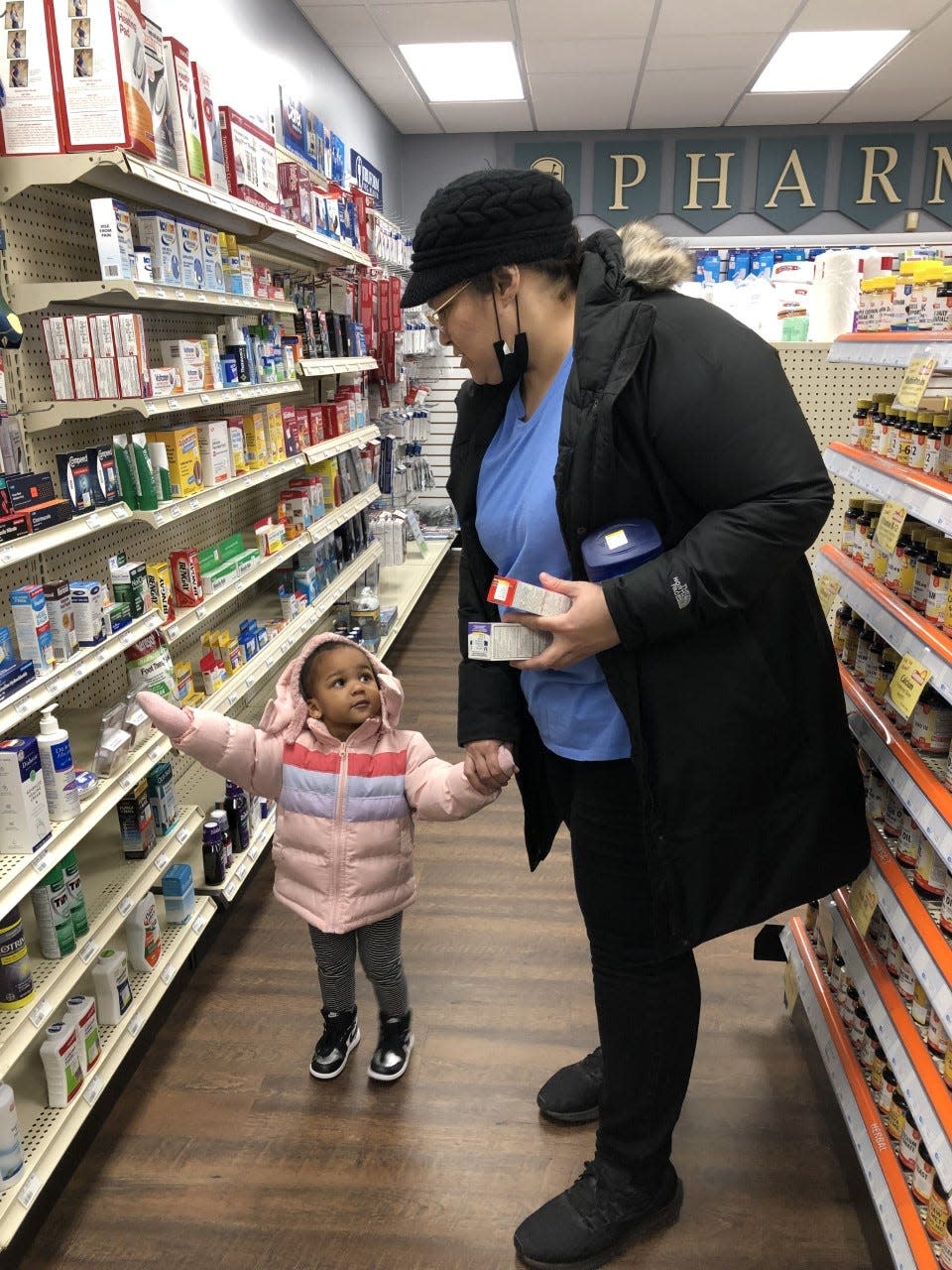Cold-relief medicines in demand as flu, RSV, COVID continue holiday surge
Adelaide Maysonet of Morrisville had some shopping to do Monday for her 2-year-old granddaughter, Harmony Johnson. Only it wasn't for holiday gifts.
Instead, she visited the Burns Pharmacy to buy some children's Tylenol and Mucinex in case little Harmony came down with a cold over the Christmas holiday weekend. And some vitamins.

Good idea, say the experts. This winter, the cold and flu season seems to be especially bad. With the COVID pandemic still ongoing, there are shortages of antibiotics and sparse shelves for pain relievers and cold and flu relief medicines at area pharmacies.
Burns pharmacist Pete Patel was too busy filling prescriptions to chat about the situation but said his supplier has been able to keep up with his customers' need.
But national drug store chains are watching the situation closely. CVS is limiting children's pain relievers to two per purchase while Walgreens is capping online purchases to six, though there is currently no limit to in-store purchases.
"Retailers nationwide are experiencing supplier fulfillment challenges due to increased demand of over-the-counter pediatric fever reducing products," said Walgreens spokeswoman Zoe Krey. She said the website updates available store inventory information frequently throughout the day and that "contactless" same day delivery or pickup are available.
More:Bucks County hospitals are growing with new trauma, critical care, cancer centers and more
"We’re committed to meeting our customers’ needs and are working with our suppliers to ensure continued access to these items," CVS spokeswoman Kara Page explained.
At Rite-Aid, spokeswoman Catherine Carter said customers can talk to the on-duty pharmacist about finding alternatives if their preferred OTC medication is out of stock.
"We are experiencing high demand of over-the-counter cold/flu medication due to high illness incidence. We are working closely with suppliers to meet the demand and mitigate shortages where possible," Carter said.
Dr. Darin Geracimos, chair of emergency medicine at St. Mary Medical Center in Middletown, said there is a shortage of Tamiflu, a prescription drug to treat flu, but the hospital has an adequate supply.
"If you have the flu or think you might, the best course of action is the usual approach: Get plenty of rest, drink plenty of fluids, and take Tylenol or ibuprofen as directed ... Viral infections need to run their course. Rest and over-the-counter treatments are for symptom relief, not symptom shortening," Geracimos said.
He said the hospital has days when it is near capacity, but most are not. There has been "a marked improvement in ED (emergency department) wait times at SMMC over the past couple of months."
Dr. John Russell, chair of the Department of Family Medicine at Jefferson Abington Hospital, said all emergency departments at area hospitals are very busy now but still have room for people needing care.
"We're in a weird world with three different viruses circulating" including the early prevalence of influenza which normally doesn't peak until February, combined with the presence of respiratory syncytial virus (RSV) and of COVID in a what has been dubbed a tridemic.
While RSV kills about 150 children annually, it kills 14,000 adults, he said, reminding everyone to take this virus seriously. Vaccines and treatments are in development. The flu, he said, "usually isn't this harsh this early in the season."
Russell said that with the holidays here, people traveling should wear masks when taking public transportation like planes and trains and anyone attending religious services should expect them to be crowded.
And people with cold symptoms should test themselves for COVID before going to religious services or holiday gatherings, especially where small children or older adults who are most vulnerable to severe illness are present.
"If you're sick, you need to stay home or wear a mask," he said.
Lower Bucks Hospital spokeswoman Michelle Aliprantis said the hospital is monitoring its census of patients closely and has backup plans if needed.
"Appropriate resources of staff, clinical partners, and supplies have been allocated to meet the needs of our patients ... We have a sufficient supply of medications to meet our community's demands and continuously evaluate with pharmacy. As part of Prime Healthcare, we have the support and resources of a national hospital system," she said.
"These plans are in place to ensure the safety and well-being of staff, patients, and physicians, who come to our hospital."
150,000 hospitalizations this flu season
The Centers for Disease Control and Prevention issues weekly flu surveillance reports. It reported that in the week ending Dec. 10 there were at least 15 million illnesses, 150,000 hospitalizations and 9,300 deaths from flu this season, including the deaths of 30 children.
In Bucks County, there were 3,492 confirmed cases of influenza that week and 5,846 in Montgomery County, the Pennsylvania Department of Health reported, with most cases being of Influenza Type A.
"Seasonal influenza activity in Pennsylvania and the United States is high and is higher than at the same time of the year during the past eight flu seasons," the DOH noted, but flu activity decreased slightly week over week. "It is too soon to confirm if this will be an early peak of the season."
This article originally appeared on Bucks County Courier Times: Doctors, pharmacies offer tips to keep healthy during holidays

